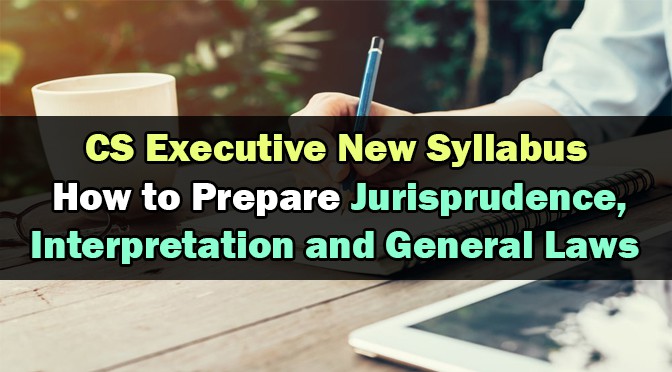BLOG, CS Executive New Syllabus
How to Prepare CS Executive Jurisprudence Interpretation General Laws
In this article we will provide you Tips on How to Prepare CS Executive Jurisprudence Interpretation General Laws for December 2020 Exam. In previous Article we have told you about Best CS Executive Jurisprudence Interpretation General Laws Video Lectures. By going through this post, you will be able to approach this subject in a effective way.
How to Prepare CS Executive Jurisprudence, Interpretation and General Laws
Introduction : This paper consists of three components, namely Jurisprudence, Interpretation and General Laws. Jurisprudence is the study of the science of law. The study of law in jurisprudence is not about any particular statute or a rule but of law in general, its concepts, its principles and the philosophies underpinning it.
Best CS Executive New Syllabus Video Lectures Combos
Objective : The primary object of the interpretation is to discover the true intention of the Legislature. The necessity of interpretation arises where the language of a statutory provision is ambiguous, not clear or where two views are possible or where the provision gives a different meaning defeating the object of the statute.The General Laws is an important pre-requisite for professional course like Company Secretary. Constitutional Law that deals with powers, functions and responsibilities of various organs of the State; Administrative law deals with day to day governance mechanism and Civil and Criminal Procedure Code, Right to Information Act, 2005 etc., spreads into approximately every phase of modern life.
How to Prepare CS Executive Jurisprudence Interpretation General Laws : Lesson 1 – Sources of Law |
| Law is not static. As circumstances and conditions in a society change, laws are also changed to fit the requirements of society. At any given point of time the prevailing law of a society must be in conformity with the general statements, customs and aspirations of its people. The object of law is order which in turn provides hope of security for the future. Law is expected to provide socio-economic justice and remove the existing imbalances in the socio-economic structure and to play special role in the task of achieving various socio-economic goals enshrined in our Constitution. It has to serve as a vehicle of social change and as a harbinger of social justice.
The objective of the lesson is to introduce the students regarding: |
How to Prepare CS Executive Jurisprudence Interpretation General Laws : Lesson 2 – Constitution of India |
| The preamble to the Constitution sets out the aims and aspirations of the people of India. It is a part of the Constitution. The preamble declares India to be a Sovereign, Socialist, Secular, Democratic Republic and secures to all its citizens Justice, Liberty, Equality and Fraternity. It is declared that the Constitution has been given by the people to themselves, thereby affirming the republican character of the polity and the sovereignty of the people.All public authorities – legislative, administrative and judicial derive their powers directly or indirectly from it and the Constitution derives its authority from the people. It is expected that, at the end of this lesson, students will, inter alia,be in a position to:
• Understand Broad Framework of the Constitution of India; |
How to Prepare CS Executive Jurisprudence Interpretation General Laws : Lesson 3 – Interpretation of Statutes |
| The primary object of the interpretation of statutes is to discover the true intention of the Legislature; and where the intention can be indubitably ascertained the courts are bound to give effect to it regardless of their opinion about its wisdom or folly. The phrase “Interpretation of Statutes” implies the judicial process of determining, in accordance with certain rules and presumptions, the true meaning of the Acts of the Parliament. In this context, the phrase would mean a process or manner that conveys one’s understanding of the ideas of the creator, or understand as having a particular meaning or significance, explanation, explication or a clarification for a particular statute or law.
The lesson aims at: |
How to Prepare CS Executive Jurisprudence Interpretation General Laws : Lesson 4 – General Clauses Act, 1897 |
| The General Clauses Act 1897 belongs to the class of Acts which may be called as interpretation Acts. An interpretation Act lays down the basic rules as to how courts should interpret the provisions of an Act of Parliament. It also defines certain words or expressions so that there is no unnecessary repetition of definition of those words in other Acts. In other words, an Interpretation Act provides a standard set of definitions or extended definitions of words and expressions commonly used in legislation. It also provides a set of rules which regulate certain aspects of operation of other enactments. In addition there are other provisions which are not merely definitions or rules of construction but substantive rules of law.
The purpose of this lesson is to provide the students with: |
How to Prepare CS Executive Jurisprudence Interpretation General Laws : Lesson 5 – Administrative Laws |
| The modern state typically has three organs- legislative, executive and judiciary. Traditionally, the legislature was tasked with the making of laws, the executive with the implementation of the laws and judiciary with the administration of justice and settlement of disputes.This has led to an all pervasive presence of administration in the life of a modern citizen. In such a context, a study of administrative law assumes great significance.
The objective of the lesson is to introduce the students regarding: |
How to Prepare CS Executive Jurisprudence Interpretation General Laws :Lesson 6 – Law of Torts |
| In general, a tort consists of some act or omission done by the defendant (tortfeasor) whereby he has without just cause or excuse caused some harm to plaintiff. To constitute a tort, there must be a wrongful act or omission of the defendant; the wrongful act must result in causing legal damage to another and the wrongful act must be of such a nature as to give rise to a legal remedy.
It is expected that, at the end of this lesson, students will, inter alia, be in a position to: |
How to Prepare CS Executive Jurisprudence Interpretation General Laws : Lesson 7 – Limitation Act, 1963 |
| The Courts in India are bound by the specific provisions of the Limitation Act and are not permitted to move outside the ambit of these provisions. Limitation Act prescribes different periods of limitation for suits, petitions or applications. Court may also admit an application or appeal even after the expiry of the specified period of limitation if it is satisfied with the applicant or the appellant, as the case may be as to sufficient cause for not making it within time.
The objective of the lesson is to facilitate the students to acquaint with: • Computation of the Period of Limitation; |
How to Prepare CS Executive Jurisprudence Interpretation General Laws : Lesson 8 – Civil Procedure Code, 1908 |
| The Civil Procedure Code consolidates and amends the law relating to the procedure of the Courts of Civil jurisdiction. The Code does not affect any special or local laws nor does it supersede any special jurisdiction or power conferred or any special form of procedure prescribed by or under any other law for the time being in force. The Code is the general law so that in case of conflict between the Code and the special law the latter prevails over the former. Where the special law is silent on a particular matter the Code applies, but consistent with the special enactment.
The objective of the lesson is to familiarize the students with: |
How to Prepare CS Executive Jurisprudence Interpretation General Laws : Lesson 9 – Indian Penal Code, 1860 |
| The Indian Penal Code, 1860 is the substantive law of crimes. In India, the base of the crime and punitive provision has been laid down in Indian Penal Code, 1860.With the proliferation in juristic persons and a growth in their activities which increasingly touch upon the daily lives of ordinary people, criminal law has evolved to bring such persons within its ambit. For example, according to section 11 of the IPC, the word ‘person’ includes any Company or Association, or body of persons, whether incorporated or not. Thus companies are covered under the provisions of the IPC. Virtually in all jurisdictions across the world governed by the rule of law, companies can no longer claim immunity from criminal prosecution on the ground that they are incapable of possessing the necessary mens rea for the commission of criminal offences. The criminal intent of the ‘alter ego’ of the company/ body corporate, i.e., the person or group of persons that guide the business of the company, is imputed to the company. It is expected that, at the end of this lesson, students will, inter alia, be in a position to: • Offences against Property; • Criminal Misappropriation of Property; • Criminal Breach of Trust; • Cheating; • Forgery; • Defamation; and • Abetment and Criminal Conspiracy. |
How to Prepare CS Executive Jurisprudence Interpretation General Laws : Lesson 10 – Criminal Procedure Code, 1973 |
| The Code of Criminal Procedure creates the necessary machinery for apprehending the criminals, investigating the criminal cases, their trials before the criminal courts and imposition of proper punishment on the guilty person. The Code enumerates the hierarchy of criminal courts in which different offences can be tried and then it spells out the limits of sentences which such Courts are authorized to pass.It is an Act to consolidate and amend the law relating to the procedure to be followed in apprehending the criminals, investigating the criminal cases and their trial before the Criminal Courts.
The objective of the lesson is to familiarize the students with: |
How to Prepare CS Executive Jurisprudence Interpretation General Laws : Lesson 11 – Indian Evidence Act, 1872 |
| The Indian Evidence Act, 1872 is an Act to consolidate, define and amend the Law of Evidence.In general the rules of evidence are same in civil and criminal proceedings but there is a strong and marked difference as to the effect of evidence in civil and criminal proceedings. In the former a mere preponderance of probability due regard being had to the burden of proof, is sufficient basis of a decision, but in the latter, especially when the offence charged amounts to felony or treason, a much higher degree of assurance is required. The persuasion of guilt must amount to a moral certainty such as to be beyond all reasonable doubt.
This lesson is designed to familiarize the students with: |
| How to Prepare CS Executive Jurisprudence Interpretation General Laws : Lesson 12 – Special Courts, Tribunals under Companies Act & Other Legislations |
| Tribunal is an administrative body established for the purpose of discharging quasi-judicial duties. Tribunals are the quasi-judicial bodies established to adjudicate disputes related to specified matters which exercise the jurisdiction according to the Statute establishing them. The Tribunal has to exercise its powers in a judicious manner by observing the principles of natural justice or in accordance with the statutory provisions under which the Tribunal is established. Companies Act, 2013 empowers the Central Government to constitute National Company Law Tribunal and National Company Law Appellate Tribunal, respectively to exercise and discharge such powers and functions as are, or may be, conferred on it by or under the Companies Act or any other law for the time being in force. It is expected that, at the end of this lesson, students will, inter alia, be in a position to: • Understand the Constitution and Powers of Tribunals; • Familiarize with Procedure before Tribunals; • Appeal to Supreme Court; and • Know the Powers of Special Courts. |
How to Prepare CS Executive Jurisprudence Interpretation General Laws : Lesson 13 – Arbitration and Conciliation Act, 1996 |
| The Arbitration and Conciliation Act, 1996 aims at streamlining the process of arbitration and facilitating conciliation in business matters. The Act recognizes the autonomy of parties in the conduct of arbitral proceedings by the arbitral tribunal and abolishes the scope of judicial review of the award and minimizes the supervisory role of Courts.
The objective of the lesson is to facilitate the students to acquaint with: |
How to Prepare CS Executive Jurisprudence Interpretation General Laws : Lesson 14-Indian Stamp Act, 1899 |
| The Indian Stamp Act, 1899 is the law relating to stamps which consolidates and amends the law relating to stamp duty. It is a fiscal legislation envisaging levy of stamp duty on certain instruments.Instrument includes every document by which any right or liability, is, or purported to be created, transferred, limited, extended, extinguished or recorded. Any instrument mentioned in Schedule I to Indian Stamp Act is chargeable to duty as prescribed in the Schedule.
The objective of the lesson is to facilitate the students to acquaint with: |
How to Prepare CS Executive Jurisprudence Interpretation General Laws : Lesson 15 – Registration Act, 1908: Registration of Documents |
| The Registration Act, 1908 is the law relating to registration of documents. The object and purpose of the Act among other things is to give information to people regarding legal rights and obligations arising or affecting a particular property, and to perpetuate documents which may afterwards be of legal importance, and also to prevent fraud.
This lesson is designed to familiarize the students with: |
| How to Prepare CS Executive Jurisprudence Interpretation General Laws : Lesson 16 – Right to Information Act, 2005 |
| The Right to Information Act, 2005 is an Act to provide for setting out the practical regime of right to information for citizens to secure access to information under the control of public authorities, in order to promote transparency and accountability in the working of every public authority, the constitution of a Central Information Commission and State Information Commissions and for matters connected therewith or incidental thereto. The Act, allowing transparency and autonomy, and access to information in public authorities.
The objective of the lesson is to facilitate the students to acquaint with: |
| How to Prepare CS Executive Jurisprudence Interpretation General Laws : Lesson 17 – Information Technology Act, 2000 |
| The General Assembly of the United Nations by resolution A/RES/51/162 dated the 30th January, 1997 has adopted the Model Law on Electronic Commerce adopted by the United Nations Commission on International Trade Law. The said resolution recommends inter alia that all States give favourable consideration to the said Model Law when they enact or revise their laws, in view of the need for uniformity of the law applicable to alternatives to paper based methods of communication and storage of information. It is considered necessary to give effect to the said resolution and to promote efficient delivery of Government services by means of reliable electronic records, Parliament enacted Information Technology Act, 2000to provide legal recognition for transactions carried out by means of electronic data interchange and other means of electronic communication, commonly referred to as “electronic commerce”, which involve the use of alternatives to paper-based methods of communication and storage of information, to facilitate electronic filing of documents with the Government agencies and further to amend the Indian Penal Code, the Indian Evidence Act, 1872, the Banker’s Books Evidence Act, 1891 and the Reserve Bank of India Act, 1934 and for matters connected therewith or incidental thereto. This lesson is designed to familiarize the students with: • Digital Signatures; • Electronic Record; • Certifying Authority; • Digital Signature Certificate; • Appellate Tribunal; and • Offences and Penalties. |
Check out our articles for other Subjects
1. How to Prepare CS Executive New Syllabus Jurisprudence, Interpretation and General Laws
2. How to Prepare CS Executive New Syllabus Company Law
3. How to Prepare CS Executive New Syllabus Setting up of Business Entities and Closure
4. How to Prepare CS Executive New Syllabus Tax Laws
5. How to Prepare CS Executive New Syllabus Corporate and Management Accounting
6. How to Prepare CS Executive New Syllabus Securities Laws and Capital Markets
7. How to Prepare CS Executive New Syllabus Economic Business and Commercial Laws
8. How to Prepare CS Executive New Syllabus Financial and Strategic Management
For CS Executive New Syllabus Video Lectures, Click on Below mentioned Subjects









